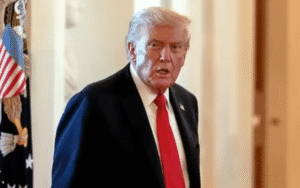Trump’s Move To Pay Troops Amid Shutdown Sets Dangerous Precedent, Experts Warn

Members of the Texas national guard assemble in Elwood, Illinois, on 7 October 2025. Photograph: Brian Cassella/TNS/ZUMA Press Wire/Shutterstock
Former President Donald Trump’s decision to pay U.S. military personnel during the ongoing government shutdown has drawn both praise and alarm. While many see it as a compassionate act toward service members caught in a political standoff, legal experts warn the move is likely unlawful and poses a serious challenge to Congress’s constitutional power to control federal spending.
The federal government shut down on October 1, after Congress failed to pass a funding bill for the new fiscal year. Around 700,000 federal workers have been furloughed, and hundreds of thousands more including many military personnel have been working without pay.
But unlike previous shutdowns, Congress has not approved defense spending or a bill ensuring troop pay, leaving the Department of Defense without funds to issue paychecks. Despite this, Trump ordered the Pentagon to move ahead with payments to active-duty troops, reportedly by repurposing $8 billion from research and development accounts within the Defense Department.
Experts Warn of “Illegal” Funding Shift
“This is going pretty far out on a legal limb,” said Phil Wallach, a senior fellow at the American Enterprise Institute who studies the separation of powers. “There’s no congressional authorization for troop payment for this fiscal year. He’s daring anybody to do anything about it and nobody wants to be the one seen opposing paying the troops.”
Legal analysts say Trump’s move may violate the Antideficiency Act, a federal law that prohibits government officials from spending money that Congress hasn’t specifically approved.
Bobby Kogan, a former White House budget official now at the Center for American Progress, called the decision “super illegal.”
“If you spend money on a purpose Congress hasn’t approved, or take funds meant for something else, that’s a violation,” he said.
Trump also claimed on Thursday that a “friend” had donated $130 million to cover military salaries during the shutdown. The Pentagon confirmed the donation was accepted under its general gift authority but said the funds would offset troop salaries and benefits — an unprecedented move that further complicates the legal picture.
Constitutional Clash Over Spending
Historically, troops have continued to be paid during shutdowns because Congress either passed a defense appropriations bill or approved temporary measures ensuring military pay. But this time, no such legislation exists.
Christopher Mirasola, a law professor at the University of Houston, said that by repurposing Defense Department funds, Trump has effectively bypassed Congress’s “power of the purse.” He warned that this sets a dangerous precedent.
“The civil servants who carried out Trump’s order could technically be prosecuted,” Mirasola said. “But it’s hard to imagine that any administration would want to punish career officials for following orders, even if they knew it was illegal.”
Experts also said that potential lawsuits against Trump’s order might fail because opponents such as lawmakers or advocacy groups would struggle to prove direct harm, a requirement for standing in court.
A Dangerous Shift in Executive Power
Observers argue that Trump’s actions fit a broader pattern of executive overreach, shifting spending power from Congress to the White House. During his presidency, Trump repeatedly withheld or redirected federal funds for political or policy reasons, including blocking foreign aid and reallocating Pentagon funds for border wall construction.
Wallach said that while paying troops is politically popular, the precedent it sets could allow future presidents to fund controversial programs unilaterally even those Congress explicitly opposes.
“I think the real crisis comes if presidents start using this power for things that aren’t widely supported,” Wallach said. “Everyone agrees troops should be paid. But what happens when it’s something divisive like deploying the military domestically?”
Lawmakers React
Some Republicans in Congress quietly expressed concern about the move, fearing it undermines their constitutional authority over appropriations. “I don’t think congressional Republicans want to see the White House take over spending decisions,” Wallach added.
Kogan echoed that warning, calling the move “an attack on the appropriations process.”
“If a president can ignore the budget entirely, drain accounts, and use money however he wants, then what’s the point of Congress?” he asked. “That’s not democracy that’s an appropriations king.”
The Bigger Picture
Beyond the legal questions, experts say Trump’s unilateral action could make it harder to end the shutdown. If lawmakers believe the president can simply fund priorities on his own, they may lose trust in the negotiation process.
“The whole point of a funding deal is compromise,” Kogan said. “If the president can just ignore whatever Congress agrees to, how can you ever make a budget?”
Mirasola warned that Trump’s decision might also affect future domestic military deployments, such as his use of National Guard troops in U.S. cities. “If the main limit on domestic troop use is Congress’s control of funding, then cutting Congress out of the process removes one of the last checks on presidential power,” he said.
For now, Trump’s decision ensures that U.S. troops will continue receiving paychecks during the shutdown but at the cost of raising profound questions about legality, accountability, and the future balance of power in Washington.
Other News
- Right-Wing Pundits Fall Into Line With One Desperate Message to Shield Trump
- Progressives Demand Chuck Schumer’s Resignation After He Caves to GOP in Shutdown Deal
- Trump’s Boldest Move Yet: Pardons for Giuliani, Meadows and 2020 “Alternate Electors”
- Trump’s Bombshell Plan: “Take Billions from Insurance Companies and Give It Directly to the People”
- Triggered Trump Explodes After Reporter Asks Why Americans Can’t Afford Groceries




